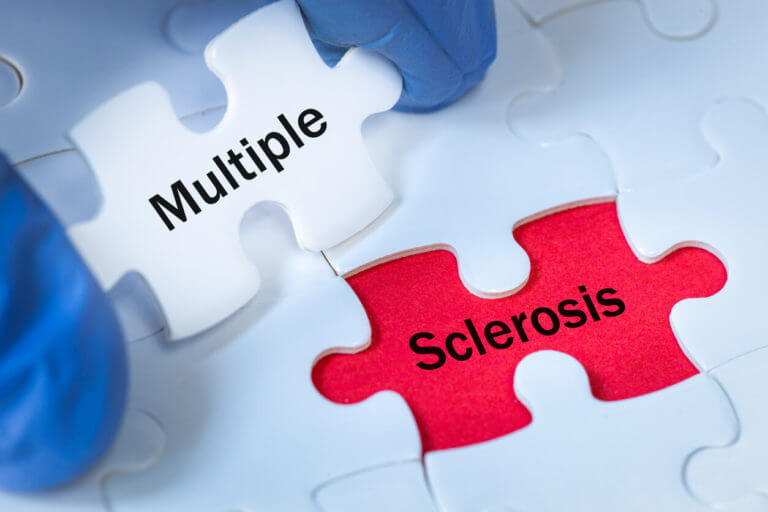
Multiple sclerosis, or MS, is a neurological disorder which affects about one million adults in the United States. The many and varied symptoms of this chronic condition develop as the person’s own immune system attacks the protective myelin sheaths which cover the body’s nerves. Keep reading to learn more about MS and the different types of multiple sclerosis.
What Are the Symptoms of Multiple Sclerosis?
MS is a neurodegenerative autoimmune disease. This means that the body’s immune system attacks itself, specifically the fatty tissue insulating the nerves. As such, effective communication between the nerves and the brain is disrupted or limited.
Symptoms of multiple sclerosis stem from this ongoing damage and disruption of nerve communication. At the outset, people who develop MS experience
- Blurry or double vision
- Numbness and tingling in the upper and lower extremities
- One side of the body has different symptoms that the other
As the disease progresses, people report symptoms such as:
- Muscular weakness, stiffening or spasticity
- Slurred speech
- Fatigue
- Dizziness
- Pain
- Bowel and/or bladder incontinence
- Erectile dysfunction and other kinds of sexual problems
- Difficulties with memory and learning
- Mental health issues, such as anxiety and depression
- Tremors
- Poor posture
- Poor bone density
As years go on, individuals with multiple sclerosis experience not only damage to the sheath covering nerves but also within the nerve cells (neurons) themselves.
What Are the Different Types of Multiple Sclerosis?
Multiple sclerosis has three different types, or expressions. These include relapsing-remitting MS, primary-progressive MS and secondary-progressive MS. Here is a closer look at each type.
Relapsing-Remitting Multiple Sclerosis
This most common form of multiple sclerosis is relapsing-remitting MS (RRMS). About 85 percent of people with multiple sclerosis have this type.
In RRMS, the symptoms come and go in cycles or episodes called relapses or attacks. A relapse is marked by an increase in existing symptoms, or the emergence of new symptoms.
After a period of time – usually weeks to months – the symptoms of relapsing-remitting multiple sclerosis lessen or disappear altogether. This is called remission. Remission can last for indefinite periods of time before another relapse occurs.
Primary Progressive Multiple Sclerosis
Primary progressive multiple sclerosis (PPMS) affects about 10 percent of people with multiple sclerosis. In PPMS, the symptoms gradually worsen over time without periods of remission. This type of MS is more common among men, and it typically begins at a later age than RRMS.
Secondary Progressive Multiple Sclerosis
Secondary progressive multiple sclerosis (SPMS) occurs in some people who initially have relapsing-remitting MS. Over time, the disease changes in severity and symptomology and becomes SPMS.
About half of all people with relapsing-remitting multiple sclerosis develop secondary progressive multiple sclerosis within 10 years of their initial diagnosis. In SPMS, there are still cycles of relapse and remission. However, the overall progression of the disease is more steady.
Treatment for Multiple Sclerosis
There is currently no cure for MS. However, many treatment options and therapies do help people manage symptoms and increase their recovery periods whenever possible. Researchers are making strides toward halting the progression of MS, reversing damage to the brain and spinal cord and ultimately, curing the disease.
For instance, treatment for relapsing-remitting multiple sclerosis focuses on reducing the number of relapses and slowing disease progression. Interventions may include disease-modifying therapies (DMTs) which decrease inflammation in the central nervous system. Other treatments include physical therapy, occupational therapy, speech therapy, and medications to manage the patient’s specific symptoms.
Multiple Sclerosis Treatment Near Me in Southeast Michigan
At Associates in Neurology, our board-certified neurology physicians and their support team help people with MS enjoy the best possible quality of life. Symptom management is key, as is counsel on positivity and maximizing overall health and function.
To learn more about multiple sclerosis, its symptoms and its types, or if you wonder if you or a loved one need an MS evaluation, please call us for a consultation at (248) 478-5512. You also can use our online appointment request form here. We have three greater Detroit area locations to serve you: Farmington, Novi and Howell, MI.
Contact us soon. We have the compassion and expertise to help you, or a loved one live your best life with multiple sclerosis.


